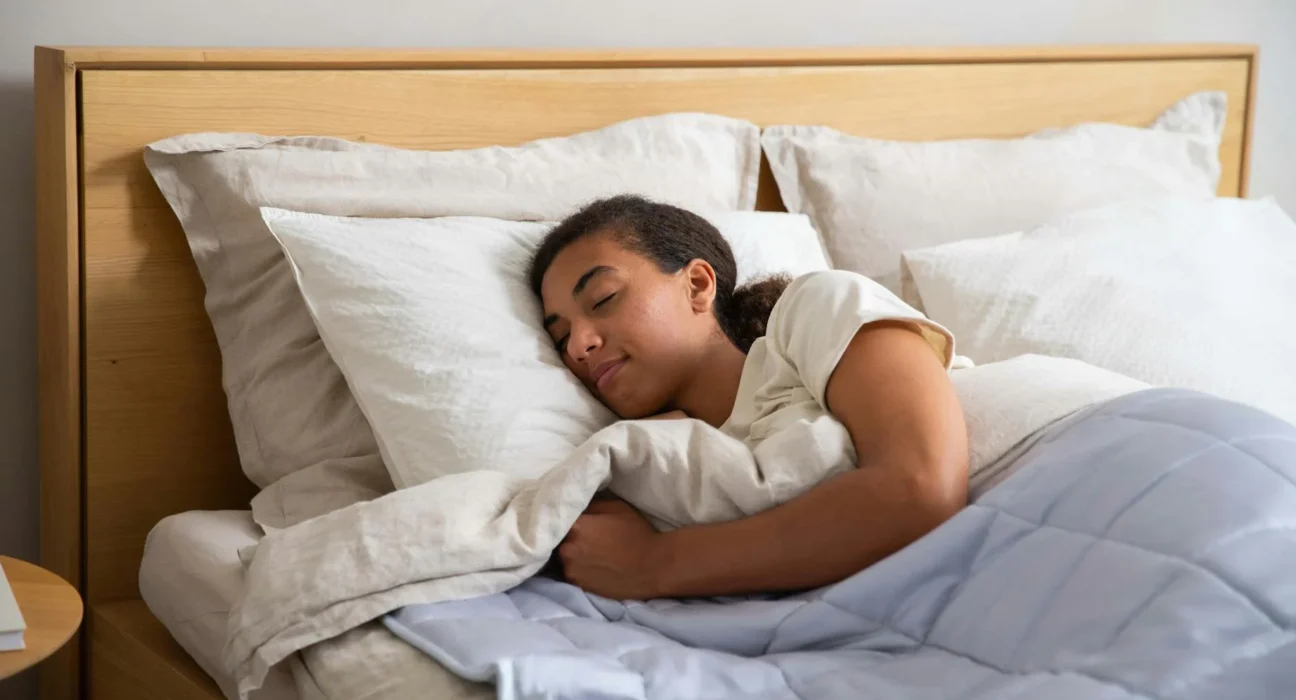You toss and turn as hours slip by, eyes wide and mind racing. Morning breaks, and it feels like you’re already behind. It’s a familiar struggle: you track calories, eat right, work out hard, but the scale barely budges. Reaching your weight loss goals sometimes feels distant, no matter how much willpower you muster.
Hidden beneath the noise of strict diets and intense exercise, one quiet factor has a powerful grip on your progress. Sleep, often overlooked, shapes your hunger, cravings, and metabolism in ways that can make or break your results. If the numbers aren’t moving the way you want, the answer could be resting right where you lay your head at night.
Why Sleep Shapes Your Weight Loss Journey
Photo by Niels from Slaapwijsheid.nl
Anyone aiming to drop pounds knows that nutrition and movement matter. But there’s a quieter influence at work every night—while you rest, your body decides how hungry or full you’ll feel tomorrow. When you don’t get enough sleep, your biology actually works against you. Two key hormones steal the spotlight, changing your hunger signals and nudging your eating habits off course. Even your brain rewires the urge to reach for sugary or fatty snacks. A couple of restless nights can tilt the scales and leave your best efforts undone.
Hormonal Players: Ghrelin and Leptin
Picture two hormones on a seesaw: ghrelin, which makes you hungry, and leptin, which tells you you’re satisfied. When sleep runs short, this delicate balance tips. Your body releases more ghrelin, the hunger hormone. At the same time, levels of leptin drop, so your feeling of fullness fades away.
- Less sleep = more hunger. Extra ghrelin urges you to eat, even when you don’t really need more fuel.
- Lower leptin leads to less satisfaction. It becomes harder to feel full, and you may keep reaching for more food even after a meal.
Research shows that these shifts are real and measurable. Studies find that after a night (or more) of limited sleep, ghrelin rises and leptin plummets, leading most people to eat more calories the next day (source, source). This is one reason why it feels so tough to stick to healthy eating after a poor night’s sleep.
The Ripple Effects of Sleep Deprivation
The problems don’t end with just feeling hungrier. After too little sleep, your brain actually craves calorie-dense treats—think sweets, fries, and pastries. This is not just in your head; it’s hardwired by changes in how your brain responds to food. You’re also more likely to snack late at night, adding even more calories to your day.
A tired brain struggles to put the brakes on impulses. Self-control drops, making it easier to cave to cravings. Scientific findings confirm that missing sleep blunts your ability to resist unhealthy snacks and react rationally around food (research on sleep and food desire, nighttime cravings and brain response). The urge to snack after dinner grows stronger, turning your kitchen into temptation territory.
What happens after a run of bad nights? You might notice:
- Stronger urges for sugary, salty, or fatty foods
- More frequent evening and night-time snacking
- Lower willpower around junk food
- Difficulty quitting a binge once you start
Simply put, sleep deprivation makes it harder to make choices that support your weight loss. A few nights of solid rest can reset these hormonal and brain signals, smooth cravings, and help make eating well feel more natural.
How Poor Sleep Slows Your Metabolism
 Photo by Andrea Piacquadio
Photo by Andrea Piacquadio
Tossing and turning at night does more than just leave you feeling groggy. Poor sleep chips away at your metabolism, making it harder for your body to burn calories efficiently. Even when your willpower stays strong, your resting metabolic rate can drop, fat burning slows down, and your body’s insulin response misfires. These shifts add up, making weight loss feel much harder than it should.
Resting Metabolic Rate Drops After Poor Sleep
Sleep is like your body’s daily tune-up. When you skimp on hours, your body reacts by running at a slower idle speed. This means your resting metabolic rate (RMR), or the calories you burn just staying alive, drops lower than you’d expect.
- Research backs this up: People who slept less burned fewer calories the next day, even during complete rest (source).
- Imagine your metabolism as a fire. With poor sleep, the embers burn weaker, so you use less energy throughout the day.
When RMR shrinks, weight loss gets stuck in the slow lane. Even if you’re eating right, the scale may hardly budge.
Your Body Burns Less Fat
Beyond basic calorie burn, sleep deprivation affects what type of weight you lose. Without solid rest, your body’s ability to break down fat for energy weakens.
- Studies show people who cut sleep during weight loss lost more muscle and less fat compared to those who slept well (adequate sleep and fat loss).
- The body starts to cling to stored fat and pull more energy from lean muscle instead.
This means that after poor sleep, you might drop a few pounds, but more comes from water and muscle than from fat. The fat sticks around, keeping you from seeing the results you want.
Insulin Response Gets Messy
Good sleep helps your body control blood sugar. When you miss out, insulin, the hormone that helps cells use sugar for fuel, becomes less effective. This is called insulin resistance.
- After a short stretch of bad sleep, your body struggles to keep blood sugar steady (sleep and blood glucose levels).
- Higher insulin levels push your body to store more fat, mostly around your belly.
- Over time, unstable blood sugar makes it even harder to burn stored fat and build lean muscle.
You start waking up hungry, craving carbs, and feeling stuck in a cycle of “eat, crash, repeat.” If you ever wondered why you feel hungrier after a bad night, this is the culprit.
Everyday Signs Your Metabolism is Dragging
You don’t need a lab test to spot the signs of a slowed metabolism. Watch for these common clues after a few rough nights:
- Feeling tired even with your usual coffee fix
- Trouble losing weight despite eating well
- Extra cravings, mainly for sugar or starch
- Thicker waistline or stubborn belly fat
When your sleep drops off, your metabolism drops with it. Give your body the rest it needs, and you’ll give your weight loss a much-needed boost.
For a more detailed look at sleep and metabolism, check out this thorough overview of sleep’s impact on metabolic health.
How Much Sleep Supports Healthy Weight Loss?
Most of us focus hard on calories and workouts, but the right amount of sleep can power up results more than we think. Regular, high-quality rest does more than help us feel refreshed; it plays a concrete role in controlling hunger, energy, and how many calories we end up eating. If you haven’t thought much about how long you sleep, you could be missing a key ingredient that helps the weight come off easier.
According to the latest expert guidelines, adults need at least seven hours of good sleep each night to support their health and metabolism. Anything less, and your body may start working against your goals (Mayo Clinic’s recommendations, CDC sleep facts).
Real-World Results: Calories, Sleep, and Your Scale
 Photo by Niels from Slaapwijsheid.nl
Photo by Niels from Slaapwijsheid.nl
Science draws a clear line between sleep amount and calorie intake. In controlled studies, adults who slept just four to five hours a night ate, on average, 300 to 400 more calories the next day compared to those sleeping seven to nine hours. That’s the size of an extra snack or even a whole meal, just because sleep was short.
Imagine a week where you’re running on five hours a night. By the end, you could eat over 2,000 extra calories without even thinking. It’s not just research: people often notice cravings spike and portion sizes grow after sleepless nights.
Let’s break down what this looks like in real life:
- The late-night snacker: After a busy workday and little sleep, you reach for chips or cookies you’d normally skip—your willpower drops.
- The hungrier morning: With too few hours, you head for bigger breakfasts or start munching as soon as you wake up.
- The lunch upgrade: Tired brains crave quick energy, often in the form of larger servings or sugary drinks at lunch.
Studies find that those who catch at least seven hours of sleep tend to eat less overall, have fewer cravings for sweets, and make more balanced choices throughout the day (Harvard Health’s sleep need guide).
Plenty of real people see changes when they fix their sleep. One person might notice the afternoon candy habit vanishes. Another might finally break a calorie plateau simply by getting to bed on time. It’s not magic—just how your body is wired. When you make sleep a regular part of your routine, it quietly shapes better food habits and gives your weight loss journey a much smoother path.
Simple Sleep Tips for Weight Loss Success
Quality sleep creates a strong foundation for managing weight. While sleep science may sound technical, making meaningful changes to your routine doesn’t require an advanced degree. Building better sleep habits is about setting up soothing signals for your body and sticking with them. These simple shifts can make sleep come easier, cravings drop off, and weight loss feel far less taxing.

Photo by Niels from Slaapwijsheid.nl
Stick to a Consistent Sleep Schedule
Your body’s clock (called the circadian rhythm) thrives on rhythm and regularity. When you go to bed and wake up at the same time each day—even on weekends—it helps your body predict when it’s time to rest and when it’s time to be alert.
- Set a regular bedtime that leaves you at least seven hours to rest.
- Wake up around the same time each morning, even on days off.
- Avoid “catching up” on lost sleep with long naps or weekend sleep-ins, as this can throw off your rhythm.
Keeping a steady schedule helps your body know when it’s safe to fully relax and recharge. A predictable routine isn’t just for kids—it’s a pillar of good sleep for adults, too. More tips on this can be found in the Mayo Clinic’s guide for better sleep.
Create a Restful, Sleep-Friendly Environment
Small changes in your bedroom can make a big difference. Darkness sends a signal that it’s time for sleep, while noise, light, or clutter tells your brain to stay alert.
Here’s how to make your room more sleep-friendly:
- Keep your space cool, quiet, and dark.
- Use blackout curtains or a sleep mask if outside lights creep in.
- Try soft bedding and supportive pillows for comfort.
- Remove devices, clutter, and anything that might grab your attention.
A tidy, calm space helps your mind slow down and fall asleep more easily.
Limit Screen Time Before Bed
The blue light from phones, tablets, and TVs blocks melatonin, your body’s natural sleep hormone. Scrolling social media or streaming shows late at night can push back your bedtime and disrupt the quality of your rest.
- Set a “device curfew” at least 30-60 minutes before lights-out.
- Read a real book, listen to music, or try gentle stretching if you need to unwind.
- Dim the lights and let your bedroom become a “no screen” zone after dark.
The more you break up with screens before bed, the sooner your brain catches the hint that it’s time to wind down. For more advice, check out the Sleep Foundation’s tips for weight loss and better sleep.
Avoid Heavy Meals and Stimulants Late in the Day
What you eat and drink—and when—matters for sleep. Heavy meals, caffeine, and even certain spicy or acidic foods can keep your body awake just when you want it to rest.
- Cut caffeine after lunch to avoid racing thoughts at bedtime.
- Opt for a light, balanced dinner; avoid eating large or fatty meals within three hours of sleep.
- If you’re hungry near bedtime, try a small, protein-rich snack instead of sweets or salty treats.
These simple tweaks can help you fall asleep faster and sleep deeper, making weight loss feel more manageable.
Build a Bedtime Wind-Down Routine
A soothing wind-down routine can act as a “sleep trigger” for your body. Repeating the same calming steps every night helps signal that it’s safe to let go, slow down, and prepare for rest.
Try some of these relaxing ideas:
- Take a warm shower or bath
- Practice breathing exercises or meditation
- Write in a journal to offload any worries
- Listen to gentle music or nature sounds
It only takes 15 to 30 minutes of purposeful winding down to cue your body for a better night of sleep.
Building these habits does more than just help you drift off. By supporting your rest each night, you’re making it easier to manage hunger, energy, and cravings each day—setting yourself up for weight loss wins that stick.
Conclusion
Sleep is more than just a chance to recharge; it’s a hidden force shaping your hunger, energy, and cravings each day. As research from 2025 keeps showing, making rest a regular, sacred part of your night can lower your calorie intake, reset your metabolism, and help you build habits that last.
Good sleep isn’t a luxury—it’s a basic tool for anyone serious about healthier weight and a clearer mind. If you’ve been chasing change with diet and exercise but progress stalls, put your bedtime first for a few weeks and watch what happens.
Let sleep be your ally and see how much lighter your days can feel. Thank you for reading—share your own sleep wins or struggles below, and join the conversation on simple habits that bring lasting results.








